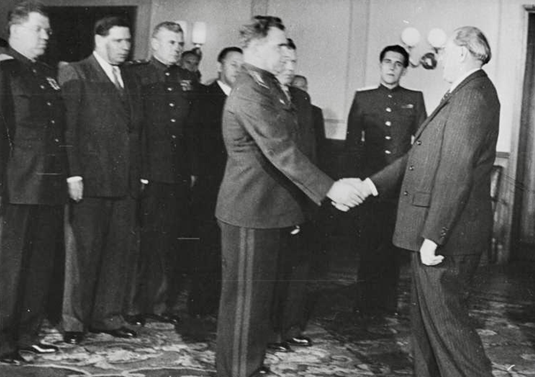An Honorary Citizen, a Fishing Tale, and a City's Liberation
- Maria A. Kithcart

- Mar 10, 2022
- 3 min read

Pictured: Marshal V. I. Chuikov was celebrated as an honorary citizen of the city of Lepel, Belarus in 1979, and a long street in the city is named after him. As a young regimental commander, he helped liberate Lepel from the White Poles on 14 May 1920.
A highly decorated veteran of the Russian Civil War and the Great Patriotic War, Marshal Chuikov was also presented with honorary citizenship awards for the cities of Volgograd, Snezhinsk, Zaporozhye, and Ulan-Ude. In 1979, he was also recognized in a special ceremony as an honorary citizen of Lepel, in northern Belarus. To be the recipient of such an award is considered to be a high honor. A city or other government may confer symbolic, honorary citizenship on a person who is deemed particularly admirable or otherwise deserving of the distinction by the government. In the case of Lepel, Chuikov was involved in the liberation of the city during the Russian Civil War in 1920. In his memoirs titled From Stalingrad to Berlin, Marshal Chuikov recalled a lighthearted anecdote about his soldiers in a fishing expedition before the liberation of the city of Lepel:
“Having gathered about 100 Red Army men and commanders, I led them to the banks of the small river Ulla [in northern Belarus]. Having lined up people on the riverbank, I threw a grenade into the water. […] In a word, the effect of the explosion was exceptional. But then something happened that I never expected. The surface of the water was covered with stunned fish. My fighters, without undressing, plunged into the pool and began to catch prey. I was seriously afraid that someone might drown in the excitement. But there were no drowned people, and the regimental kitchens received fresh fish. At that famine time, every piece of meat and fish was worth its weight in gold.”
Prior to the liberation of Lepel, Regiment Commander Chuikov gathered as much intelligence as possible. Having captured two enemy soldiers, they shared in detail about the surrounding fortifications which aided in planning the attack:
“The prisoners told us in detail about the fortifications and forces defending Lepel, indicated on the map the places where trenches were going, the location of machine-gun nests, observation posts—in a word, they provided extremely valuable information. I breathed a sigh of relief—the start was good.
The offensive was scheduled for May 14th. During the night, the regiment turned around to attack, and I contacted my neighbor on the left, the 44th Infantry Regiment of our brigade. From the neighbor on the right—the 6th division—we were separated by the Ulla River.
Almost all of the division's artillery was to be concentrated in the sector of the 43rd and 44th regiments in order to support us with fire. But we found only one Matveev battery in position, with which we often interacted in the east. Other gunners were late for their firing positions. I had to be nervous for another reason. Dawn was coming, it was getting lighter every minute, but there was still no connection with the command posts of the brigade and division.
I, a 20-year-old regiment commander, faced a difficult problem: to wait for the artillery to approach and communicate with the command, thereby losing the chances of a sudden strike, or to immediately, without fire support, raise the regiment to attack. There was a big risk in both decisions. And the regiment deployed in battle formation was waiting for the order. The enemy had already discovered our battle formations in some places, and a skirmish began.
Ivan Katalev, our Commissar, and Adjutant Nesgovorov were next to me. They looked at me expectantly. The situation escalated with every minute. Soon the sun will rise, and we will be in front of the enemy at a glance. This threatened to disrupt the entire operation.
And I made up my mind. Through the adjutant, I conveyed the order to the Battery Commander Matveev to immediately open fire on the enemy’s second line of defense, which runs almost near the city, and, turning to the Commissar, I said: “Let's go into the chain—and attack.” With satisfaction, I saw a joyful twinkle in the eyes of Katalev and Nesgovorov. A sigh of relief escaped them both. It became easier in my soul. The Commissar and I stood up to our full height: ‘Follow us, attack!!’”



